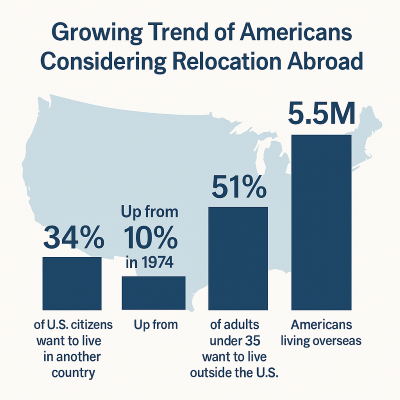Thinking about fleeing the U.S.?
By Paul Kaplan of The Paul Kaplan Group
Let’s face it—waking up to the news in the U.S. lately feels like a nonstop episode of reality TV... but the kind that makes you want to throw your remote through the window. Whether it’s political unrest, culture wars, or the general sense of unease, many Americans are finding themselves saying, “What if we just left?”
And we’re not just talking hypotheticals. More and more people are seriously exploring the idea of relocating—sometimes across state lines, and sometimes across oceans. The idea of sipping espresso in the French Riviera instead of doomscrolling the morning headlines? Sounds pretty appealing right now. I've thought about it myself and have done some extensive research on this topic.
Recent data shows a growing number of Americans are seriously considering relocating abroad. A 2024 Monmouth University Poll revealed that 34% of U.S. citizens now express a desire to live in another country—up from just 10% in 1974—with over half of adults under 35 saying they'd like to make the move. Political leanings also play a role, with more independents and Democrats exploring the idea. Following the 2024 election, searches for how to move abroad spiked dramatically, especially to countries like New Zealand. While only around 5.5 million Americans currently live overseas, the growing interest reflects the broader mood of uncertainty and desire for change—and highlights how important it is to be informed and prepared before making a move.

We’ve seen a noticeable uptick in clients who are over it. And not just from those wanting to move out of the country. Some are considering moves to more liberal, like-minded areas within the U.S.—specifically, from red states to blue ones. California, with its more progressive stance on everything from healthcare to LGBTQ+ rights to environmental protections, has become a sanctuary of sorts for those wanting to escape what they see as increasingly hostile or restrictive environments.
On the flip side, our Canadian neighbors are also reevaluating their place in the American dream. We've had several Canadians reach out to our team, wanting to list their U.S. homes and return north of the border. (Read more). With the current U.S. administration’s tone toward international allies becoming more strained, many Canadians no longer feel welcome here. And with their own Prime Minister recently advising Canadians to avoid travel to the U.S., some have decided it’s time to pack up and head home. (Read more here).
Thinking About Leaving the U.S.? Here’s What to Consider
Before you pack your bags and head to the airport, there are a few important things to think through if you’re seriously considering fleeing the U.S.:
Where to Go: Not every country is going to welcome you with open arms without a little paperwork. Most countries require a visa for long-term stays, and some even have strict qualifications. So do your homework early.
Types of Visas: There are different types of visas available depending on your situation. Some countries offer Golden Visas, which allow you to fast-track residency if you invest in local businesses or buy property. Others may offer Digital Nomad Visas, which are ideal if you work remotely and want to live abroad without going through the traditional (and often lengthy) immigration process.
Retirement Visas: If you’re retired or no longer earning income, certain countries offer retirement visas that can make residency easier. This can be a great option for those looking to slow down in a place that aligns with their lifestyle and values.
Understand the Tax Implications: Moving abroad doesn't mean you can ditch Uncle Sam. The U.S. taxes based on citizenship, not just residency. However, many countries have tax treaties with the U.S. to help you avoid double taxation. Know what you're getting into before making the move.
Get Help from the Experts: There are entire industries dedicated to helping people navigate international relocations. Immigration attorneys, visa agencies, and expat consultants can walk you through the paperwork, taxes, and logistics.
Selling Your U.S. Property: If you own investment property and are considering moving abroad, a 1031 exchange might be something to explore. This allows you to defer taxes by reinvesting in a similar or higher-value property—something worth discussing with a tax advisor before selling.
If You’re Canadian: We’re also seeing a wave of Canadians deciding to sell their U.S. homes and head back north, especially with the current U.S. administration’s stance on foreign relations. Canada’s Prime Minister has even issued a notice advising against travel to the U.S. If you're Canadian, you’ll be subject to special tax withholding rules when selling your U.S. property. You may get some of those taxes back, but there’s paperwork and timing to consider.
Medical Insurance: One crucial factor that often gets overlooked in the excitement of moving abroad is medical insurance. Unlike the U.S., where private insurance dominates the healthcare system, many countries offer universal healthcare—but that doesn’t always mean you're automatically covered as a newcomer. Before relocating, it's important to research whether the country you’re moving to allows foreign residents to access public healthcare, or if you’ll need to purchase private international health insurance. Costs and coverage can vary widely depending on your age, health status, and the destination. Additionally, some visa types require proof of valid health insurance as part of the application process. Making sure you're protected medically isn’t just about emergencies—it’s peace of mind that lets you truly enjoy your new life abroad without worrying about unexpected expenses.
When’s the Right Time to Sell? Honestly, there’s no “perfect” time. But we are seeing some softening in the local Palm Springs market—particularly in neighborhoods that are heavy on vacation rentals. That means it may be wise to consider selling sooner rather than later, especially with political uncertainty in the air that could impact property values.
What’s the Best Time to Sell in the U.S.? If you’re considering selling in the U.S., the best time to sell is—well, when you're ready to sell. It sounds obvious, but it’s true. If selling has been on your mind, don't wait for a magic window. The right time is when you're prepared to make the move.
Whatever side of the political spectrum you land on, the fact is—people are moving. Whether it’s to escape, seek comfort, or just hit the reset button.
Here at The Paul Kaplan Group, we've been helping buyers and sellers navigate big life decisions for over 25 years. We understand that relocating—whether it's to the other side of town or another country—isn't something you do lightly. If you're thinking about selling your home, or maybe you're considering moving to a more like-minded community like Palm Springs, we’re here to help.
Palm Springs offers a welcoming, inclusive community with a more relaxed pace of life. And if you’re looking to sell, now might be a strategic time—while the market is still strong, and buyers are searching for exactly what you have.
Whatever your plans, your future, or your frustrations, The Paul Kaplan Group is here to help guide you through it. Let’s talk. 760-459-1396 or [email protected]
Selling Your Home?
Get your home's value - our custom reports include accurate and up to date information.


